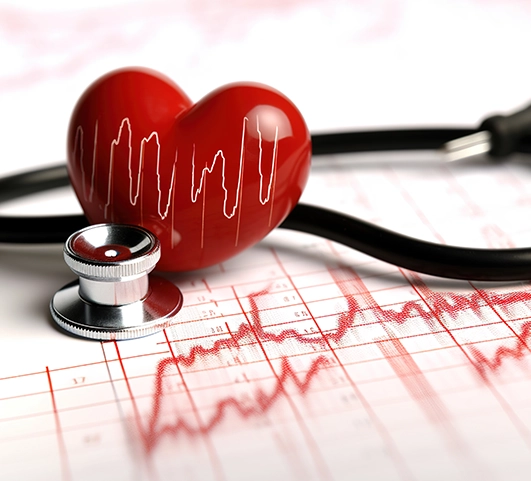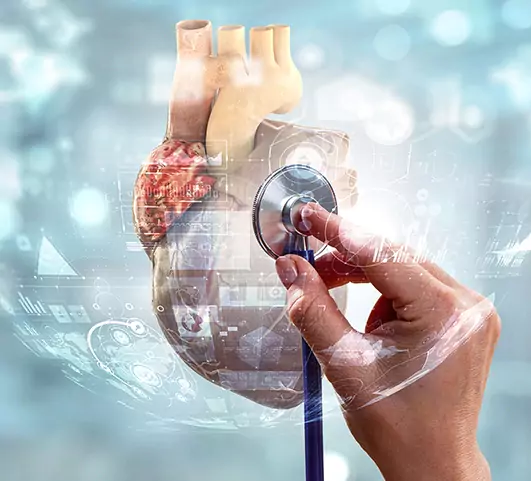


Assessing your heart rhythm with precision-guided Electrophysiology Studies.
Artemis Cardiac Centre is listed among the top hospitals for Cardiac Care in India. It is a hub of excellence, offering the most comprehensive diagnostic and treatment modalities, like Electrophysiology Studies, for thorough evaluation and management of patients with problems related to the heart rhythm. The hospital pioneers innovation and advancements to make sure you have access to the finest facilities and services, at every step of the journey to better heart health.
Our team strictly adheres to personalized treatment plans because we believe that every individual has unique medical requirements. Throughout your journey from treatment to recovery, we ensure your medical needs are being catered to with a robust approach.
ENQUIRE NOW

Electrophysiology studies (EP), also known as invasive cardiac electrophysiology, are performed to evaluate the cardiac conduction system of the patient to determine any abnormality in the heart rhythms. This is done using tiny electrodes, which are inserted into the patients body and guided towards the heart with the help of imaging guidance offered by a fluoroscope. These electrodes help to assess the flow of electrical signals in the targeted areas of the heart, as well as to stimulate these areas of the heart. EP studies play a vital role in helping doctors determine the best treatment strategy for patients with a personalized approach, allowing them to deliver the best outcomes.
Electrophysiology studies are recommended for patients who have any problem related to the hearts electrical conductivity. Your doctor may advise you to get it done if you are presenting with the symptoms of arrhythmia or have been diagnosed with it. You may also need it if you have an existing medical condition that puts you at a high risk of having heart failure or if your arrhythmia is recurrent and resistant to the treatments.
Electrophysiology Studies is broadly classified and based on the technique that is used:
ENQUIRE NOWIt can take around 2 to 3 hours or more.
Patients are required to stay at the hospital for a couple of hours and discharged on the same day.
It takes around 5 to 7 days to get back to work
We have restored hundreds of patients' lives with timely angioplasty at Artemis Cardiac Care Chennai. Whether it's an emergency heart attack or a planned procedure, our cardiology team has achieved consistent, high-success rates.
Our individualized care, state-of-the-art facilities, and post-procedure care are valued by our patients. We're honored to be Chennai go-to heart care partner, providing both clinical expertise and humane healing.




Distinguished Cardiac Care Expertise
Eminent Cardiac Care Integrated with Advanced Technology
Transformed Lives with Trust and Care .
You may be recommended to go for angioplasty if you are experiencing any of the following symptoms linked to coronary artery disease, which are not responding to medication and lifestyle modifications:

If you are experiencing unexplained fainting

If you are at a high risk of having heart failure

If your arrhythmia is recurrent

If your heart rhythm is rapid or irregular

If you feel lightheaded often

If you have arrhythmias that are difficult to control

For evaluations before Cardiac Ablation for Arrhythmia

For assessing the prognosis of patients with ICD
Various Benefit of Electrophysiology Studies are:
Yes, Electrophysiology Studies can be done along with other cardiac procedures. It is generally done prior to cardiac ablation procedure, to assess the patient and determine the best course of treatment.
Electrophysiology Studies are widely recommended by Doctors, however, there are several factors that could affect your eligibility to undergo the procedure. These are:
In the majority of the cases, the patients are able to resume normal activity within a day or two, following electrophysiology studies.
Electrophysiology Study can be used to diagnose and assess various different types of arrhythmias but not all of them. In some cases, the patients may require continuous monitoring and other diagnostic modalities for precise assessment.
Just like any other medical procedure There are several risks associated with Electrophysiology Study as well. These include vascular damage, infection and bleeding.
From Recent Advancements in Heart Care to Tips and Tricks to make your Heart Healthy Again, stay updated with reliable and informative blogs by our experts.
View All Blogs

